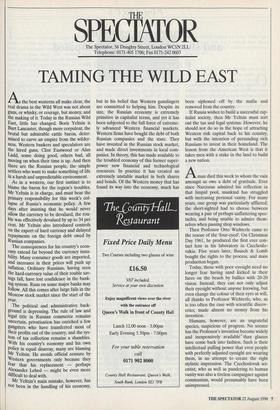SPECTATOR
The Spectator, 56 Doughty Street, London WC1N 2LL Telephone: 0171-405 1706; Fax 0171-242 0603
TAMING THE WILD EAST
As in a western, our first instinct is to blame the baron for the region's troubles. Mr Yeltsin is in charge, and must bear the Primary responsibility for this week's col- lapse of Russia's economic policy. A few days after insisting that he would never allow the currency to be devalued, the rou- ble was effectively devalued by up to 34 per cent. Mr Yeltsin also introduced controls on the export of hard currency and delayed repayments on the foreign debt owed by Russian companies.
The consequences for his country's econ- omy extend far beyond the currency insta- bility. Many consumer goods are imported, and increases in their prices will push up inflation. Ordinary Russians, having seen the hard-currency value of their rouble sav- ings fall, have lost confidence in the bank- ing system. Runs on some major banks may follow. All this comes after large falls in the Moscow stock market since the start of the Year.
The political and administrative back- ground is depressing. The rule of law and legal title in Russian commerce remains uncertain, privatisation has enriched a few gangsters who have transferred most of their profits out of the country, and the sys- tem of tax collection remains a shambles. With his country's economy and his own policy in equal disarray, many are blaming Mr Yeltsin. He avoids official censure by Western governments only because they fear that his replacement — perhaps Alexander Lebed — might be even more difficult to deal with.
Mr Yeltsin's main mistake, however, has not been in the handling of his economy, but in his belief that Western gunslingers are committed to helping him. Despite its size, the Russian economy is extremely primitive in capitalist terms, and yet it has been subjected to the full force of extreme- ly advanced Western financial markets. Western firms have bought the debt of both Russian companies and the state. They have invested in the Russian stock market, and made direct investments in local com- panies. In theory, this has made available to the troubled economy of this former super- power new financial and technological resources. In practice it has created an extremely unstable market in both shares and bonds. Of the Western money that has found its way into the economy, much has been siphoned off by the mafia and removed from the country.
If Russia wishes to build a successful cap- italist society, then Mr Yeltsin must sort out the tax and legal systems. However, he should not do so in the hope of attracting Western risk capital back to his country, but with the intention of persuading rich Russians to invest in their homeland. The lesson from the American West is that it takes men with a stake in the land to build a new nation.
Aman died this week to whom the vain amongst us owe a debt of gratitude. Ever since Narcissus admired his reflection in that limpid pool, mankind has struggled with increasing personal vanity. For many years, one group was particularly afflicted; the short-sighted had to choose between wearing a pair of perhaps unflattering spec- tacles, and being unable to admire them- selves when passing shop windows.
Then Professor Otto Wichterle came to the rescue of the lour-eyed'. On Christmas Day 1961, he produced the first ever con- tact lens in his laboratory in Czechoslo- vakia. Five years later, Bausch & Lomb bought the rights to the process, and mass production began.
Today, those with poor eyesight need no longer fear having sand kicked in their faces on the beach by bullies with 20-20 vision. Instead, they can not only adjust their eyesight without anyone knowing, but even change the colour of their eyes at will, all thanks to Professor Wichterle, who, as is too often the case with scientific discov- eries, made almost no money from his invention.
Humans, however, are an ungrateful species, suspicious of progress. No sooner has the Professor's invention become widely and inexpensively available' than glasses have come back into fashion. Such is their intellectual pulling power that even people with perfectly adjusted eyesight are wearing them, in an attempt to create the right stylistic impression. The Czechoslovak sci- entist, who as well as pandering to human vanity was also a tireless campaigner against communism, would presumably have been unimpressed.
























































 Previous page
Previous page